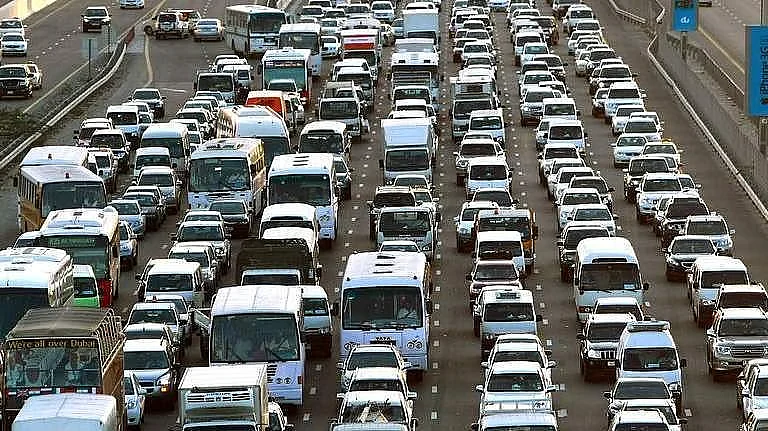
UAE Plans New Traffic Systems, Policies, Transport Options To Curb Peak-Hour Rush
A sharp rise in private-vehicle ownership and heavy peak-hour congestion are prompting the UAE to prepare new mobility policies, smarter traffic systems and alternative transport options, Minister of Energy and Infrastructure Suhail Al Mazrouei said on Wednesday.
Speaking at the UAE Government Annual Meetings in Abu Dhabi, Al Mazrouei said the number of vehicles on UAE roads has been increasing by more than eight per cent annually - compared to a global average of around two per cent - as population and economic activity continue to expand. Overlapping school and work hours also add to peak-time pressure on federal and local road networks, he noted.
Recommended For YouThe issue is particularly acute between Dubai and the Northern Emirates, where traffic bottlenecks have long frustrated commuters. The Federal National Council heard this year that an employee commuting between the two emirates can lose approximately 460 hours annually - equivalent to 60 working days - to traffic.
Stay up to date with the latest news. Follow KT on WhatsApp Channels.
The member who raised the issue, Dr Adnan Al Hammadi, said the situation“leads to anxiety” for thousands who endure hours-long trips on what should be short journeys.
Addressing congestion is a central national priority for government transport entities, the minister said.
The ministry will work with local authorities to update policies and regulations aimed at easing traffic, managing vehicle growth and encouraging greater use of public and shared transport. Enhanced efficiency of public transport networks will help reduce reliance on private vehicles, he added.
As part of its strategy, the ministry is enhancing traffic-management systems and deploying technology-enabled tools to improve journey reliability. A 24-hour integrated traffic-monitoring centre currently analyses congestion patterns and proposes targeted solutions across the federal network.
Alongside road upgrades and regulatory measures, Al Mazrouei highlighted rail as a major pillar of the UAE's mobility future. Etihad Rail passenger services remain on track to launch by 2026 under the Dh50-billion UAE Railway Programme announced in 2021.“The network will strengthen connectivity between cities and communities, reduce traffic congestion, and meet passenger needs in accordance with the highest international standards,” he said.
Officials say the combination of road expansion, public-transport integration, policy updates and smart-mobility technologies will ensure the UAE stays ahead of rising demand for transport infrastructure as the population grows and economic activity accelerates.

Legal Disclaimer:
MENAFN provides the
information “as is” without warranty of any kind. We do not accept
any responsibility or liability for the accuracy, content, images,
videos, licenses, completeness, legality, or reliability of the information
contained in this article. If you have any complaints or copyright
issues related to this article, kindly contact the provider above.


















Comments
No comment